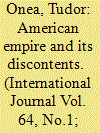| Srl | Item |
| 1 |
ID:
088751


|
|
|
| 2 |
ID:
151573


|
|
|
|
|
| Summary/Abstract |
The article examines when and how often great powers are likely to follow a grand strategy of restraint and whether there is any evidence that they have ever done so. The question has considerable implications for the ongoing US grand strategy debate. Restraint refers to the practice of self-discipline in the use of force for self-defence or for addressing massive power imbalances; and in extending security commitments to foreign political actors. The first part of the article examines statistics in the last two hundred years on great power involvement in wars and disputes as well as on their commitments to alliances and dependencies. The second part considers whether two seeming cases of the dominant power scaling down its international involvement – Ming China withdrawal from naval mastery in the fifteenth century and Victorian Britain splendid isolation – represent instances of genuine restraint.
|
|
|
|
|
|
|
|
|
|
|
|
|
|
|
|
| 3 |
ID:
113814


|
|
|
|
|
| Publication |
2012.
|
| Summary/Abstract |
This paper tests the explanatory power of the main strands of neoclassical realism in accounting for US foreign policy after the Cold War. According to the emphasis they place on the relevance of structural versus non-structural variables in foreign policy making, three schools can be identified. The first school restricts the role of non-structural factors to accounting for anomalous behavior; the second school argues that non-structural variables should also be included in order to understand the policy's timing and style, and, in times of security plenty, its content; while the third school contends that it is international structural factors, i.e. a state's strategic interactions with other polities, that shape most foreign policy. Following the test of their forecasts versus the historical record, the third school emerges as providing the most accurate account and as the most promising avenue of research for neoclassical realism.
|
|
|
|
|
|
|
|
|
|
|
|
|
|
|
|
| 4 |
ID:
081326


|
|
|
|
|
| Publication |
2008.
|
| Summary/Abstract |
This article takes a critical look at the established wisdom regarding the early twentieth century dispute between Canada and the United States over the contours of the Alaska Panhandle. In Canada, the affair is commonly recollected as having featured a sinister combination of American nationalist bullying and duplicitous British diplomacy. The result, according to a Canadian nationalist mythology that resonates to this day, is that Canada was effectively "sacrificed" by Britain at the altar of American territorial acquisitiveness. The reality, as argued in this article, is radically different from the mythology. Far from having "sold out" Canada, Britain was instrumental in securing for it a reasonably generous settlement on the part of an American administration that showed itself prepared to countenance the actual shrinkage of US territory. Rather than being motivated by a politics of bullying, the administration of Theodore Roosevelt was driven by diplomacy of honour
|
|
|
|
|
|
|
|
|
|
|
|
|
|
|
|